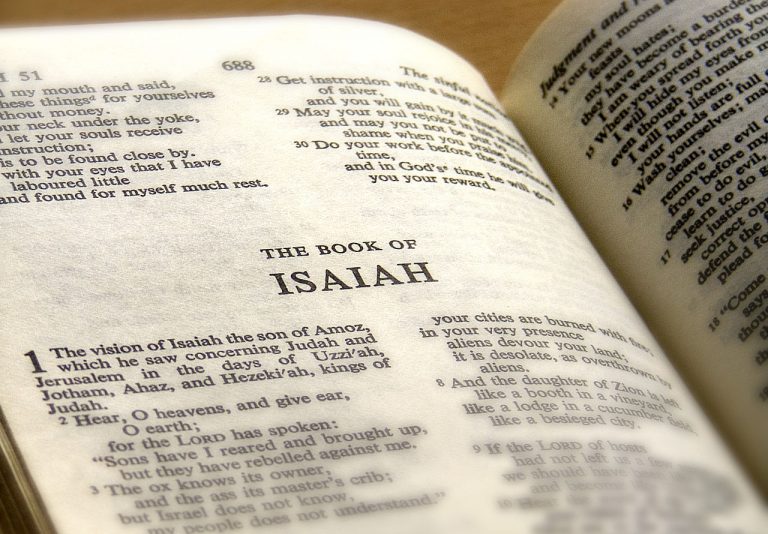Isaiah Sent to King Ahaz
7 In the days of Ahaz the son of Jotham, son of Uzziah, king of Judah, Rezin the king of Syria and Pekah the son of Remaliah the king of Israel came up to Jerusalem to wage war against it, but could not yet mount an attack against it. When the house of David was told, “Syria is in league with Ephraim,” the heart of Ahaz and the heart of his people shook as the trees of the forest shake before the wind.
And the LORD said to Isaiah, “Go out to meet Ahaz, you and Shear-jashub your son, at the end of the conduit of the upper pool on the highway to the Washer’s Field. And say to him, ‘Be careful, be quiet, do not fear, and do not let your heart be faint because of these two smoldering stumps of firebrands, at the fierce anger of Rezin and Syria and the son of Remaliah. Because Syria, with Ephraim and the son of Remaliah, has devised evil against you, saying, “Let us go up against Judah and terrify it, and let us conquer it for ourselves, and set up the son of Tabeel as king in the midst of it,” thus says the Lord GOD:
“‘It shall not stand,
and it shall not come to pass.
For the head of Syria is Damascus,
and the head of Damascus is Rezin.
And within sixty-five years
Ephraim will be shattered from being a people.
And the head of Ephraim is Samaria,
and the head of Samaria is the son of Remaliah.
If you are not firm in faith,
you will not be firm at all.’”
The Sign of Immanuel
Again the LORD spoke to Ahaz: “Ask a sign of the LORD your God; let it be deep as Sheol or high as heaven.” But Ahaz said, “I will not ask, and I will not put the LORD to the test.” And he said, “Hear then, O house of David! Is it too little for you to weary men, that you weary my God also? Therefore the Lord himself will give you a sign. Behold, the virgin shall conceive and bear a son, and shall call his name Immanuel. He shall eat curds and honey when he knows how to refuse the evil and choose the good. For before the boy knows how to refuse the evil and choose the good, the land whose two kings you dread will be deserted. The LORD will bring upon you and upon your people and upon your father’s house such days as have not come since the day that Ephraim departed from Judah—the king of Assyria!”
In that day the LORD will whistle for the fly that is at the end of the streams of Egypt, and for the bee that is in the land of Assyria. And they will all come and settle in the steep ravines, and in the clefts of the rocks, and on all the thornbushes, and on all the pastures.
In that day the Lord will shave with a razor that is hired beyond the River—with the king of Assyria—the head and the hair of the feet, and it will sweep away the beard also.
In that day a man will keep alive a young cow and two sheep, and because of the abundance of milk that they give, he will eat curds, for everyone who is left in the land will eat curds and honey.
In that day every place where there used to be a thousand vines, worth a thousand shekels of silver, will become briers and thorns. With bow and arrows a man will come there, for all the land will be briers and thorns. And as for all the hills that used to be hoed with a hoe, you will not come there for fear of briers and thorns, but they will become a place where cattle are let loose and where sheep tread.
(ESV)
Isaiah 7 Commentary
by Brad Boyles
War has broken out and Jerusalem is under attack. Amazingly, God shows King Ahaz mercy by commanding him to stay calm and courageous, even though he was a terribly immoral king.
The Lord sends Isaiah with his son Shear-jashub to meet with King Ahaz. The specific sending of Sheat-jashub is not a coincidence. His name means, “the remnant shall return (or turn).” This alone was what Ahaz needed to hear. He was in a vulnerable position and repentance was necessary.
The bottom-line message: “If you will not believe, you surely shall not last.”‘ What a statement! God was drawing a line in the sand with King Ahaz. He intended to protect him, and promised a blessing, However, it was contingent upon his faith.
This warning serves to remind us, positively, of the power of faith. Faith is encouraged and strengthened by difficulties. Faith faces what to the natural mind are impossibilities, and, resting on the promises of God, relies upon Him to fulfill His counsel concerning them and to turn the obstacles to account for His glory.
W.E. Vine
Ahaz, however, did the opposite. Under a disguise of piety, Ahaz decided he would not “test the Lord.” It was pitiful. It was a huge mistake. Ahaz, in a sense, threw the baby out with the bathwater. He assumed that he was better off not seeking the Lord, and then justified it with a “religious tone.” Oh, how we justify things in the name of religion. As long as it sounds “religious,” it must be good, right?
Interestingly, since Ahaz refused a sign, the Lord would give one anyway. It would come through the prophet Isaiah and would signal the coming Messiah.
“Judah could not be destroyed, for our Lord was to spring out of Judah; and this was the sign that Judah must stand, because Immanuel must be born of that nation, and the time for this great event was fixed by the Lord. …God meant to cut off both those kings, and he did so. This was a very wonderful prophecy, and ought to have filled Ahaz with great delight, and with confidence in God; but it did nothing of the kind.”
C.H. Spurgeon
This passage makes me wonder – what future events are hanging in the balance because of our selfishness? Ahaz didn’t want to hear it. He wanted to do his own thing. Even when faced with a military attack, Ahaz preferred to tremble than to call on the Lord. Where are we refusing to step up to the plate? Where are we neglecting the responsibility of the Lord’s calling?





How many times does God tell us to “fear not” ( enough for a year ?) but yet we still fear- fear of the what if’s, unknowns, future not only for ourselves but for others. One of my fears is that of letting my Heavenly Father down or fearing that He is disappointed in my action or the lack of action. (We won’t get into the disappointment my thoughts bring) so as a disciple of Yeshua , I feel and sometimes fear the pressure to “do what is right “because I know others are watching and waiting for the mistakes to happen. And when I disappoint Him, I know it immediately. It requires a lot of repentance and forgiveness which can only happen in a close relationship and communication with Our Father ?
Absolutely! Trusting becomes much different when viewed through a relationship with our Father.